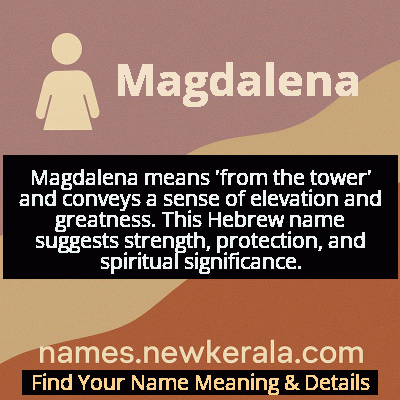Magdalena Name Meaning & Details
Origin, Popularity, Numerology Analysis & Name Meaning of Magdalena
Discover the origin, meaning, and cultural significance of the name MAGDALENA. Delve into its historical roots and explore the lasting impact it has had on communities and traditions.
Name
Magdalena
Gender
Female
Origin
Hebrew
Lucky Number
4
Meaning of the Name - Magdalena
Magdalena means 'from the tower' and conveys a sense of elevation and greatness. This Hebrew name suggests strength, protection, and spiritual significance.
Magdalena - Complete Numerology Analysis
Your Numerology Number
Based on Pythagorean Numerology System
Ruling Planet
Uranus (Rahu)
Positive Nature
Strong sense of order, loyal, practical, and disciplined.
Negative Traits
Stubborn, overly serious, rigid, and prone to feeling restricted.
Lucky Colours
Blue, gray.
Lucky Days
Saturday.
Lucky Stones
Blue sapphire.
Harmony Numbers
1, 7, 8.
Best Suited Professions
Managers, engineers, accountants, organizers.
What People Like About You
Dependability, discipline, practicality.
Famous People Named Magdalena
Mary Magdalene
Biblical Figure
One of Jesus' most devoted followers and first witness to his resurrection
Magdalena Abakanowicz
Sculptor
Internationally renowned Polish artist known for large-scale textile installations
Magdalena Neuner
Biathlete
German Olympic gold medalist and multiple World Champion in biathlon
Magdalena Frackowiak
Model
Polish supermodel and Victoria's Secret Angel
Name Variations & International Equivalents
Click on blue names to explore their detailed meanings. Gray names with will be available soon.
Cultural & Historical Significance
The name carries particular significance in Catholic and Orthodox traditions, where Mary Magdalene is venerated as a saint. In many European countries, especially Poland, Spain, and Germany, Magdalena remains a popular choice that connects children to both religious heritage and cultural identity. The name's association with towers and elevation has also given it connotations of strength, protection, and spiritual ascent, making it appealing across various Christian denominations and beyond. The cultural impact extends to literature, art, and music, where Mary Magdalene has been depicted as a complex figure of faith, love, and transformation for centuries.
Extended Personality Analysis
Women named Magdalena are often perceived as strong, resilient, and deeply intuitive individuals. The name's connection to towers suggests someone who provides stability and protection to others, often serving as a pillar of strength in their families and communities. They tend to be thoughtful and introspective, with a natural inclination toward spiritual or philosophical pursuits. Many Magdalenas display a quiet confidence and determination that helps them overcome challenges while maintaining their compassionate nature.
These individuals typically possess a blend of traditional values and modern independence, making them adaptable yet grounded. They're often described as loyal friends and devoted partners who value deep, meaningful connections. The historical association with Mary Magdalene may contribute to perceptions of Magdalenas as transformative figures—people who help others see new perspectives or overcome personal limitations. Their combination of emotional depth and practical strength makes them natural leaders and healers in their chosen fields, often excelling in professions that require both empathy and resilience.
Modern Usage & Popularity
Magdalena maintains steady popularity across Europe, particularly in Poland where it consistently ranks among the top 50 names for girls. In Spanish-speaking countries, it remains a classic choice with moderate usage. The name has seen a resurgence in English-speaking countries as parents seek traditional names with spiritual significance and international appeal. Modern parents are drawn to Magdalena for its elegant sound, strong historical roots, and the availability of appealing nicknames like Maggie, Lena, and Magda. While not among the most popular names in the United States, it has shown gradual increased usage since the 1990s, reflecting growing appreciation for multicultural and historically significant names. The name's versatility allows it to fit both traditional and contemporary naming styles, making it a timeless choice that bridges generations.
Symbolic & Spiritual Meanings
The name Magdalena symbolizes spiritual elevation, strength, and transformation. The tower imagery represents both physical and metaphorical heights—suggesting aspiration, protection, and the ability to see beyond immediate circumstances. Like a tower that provides vantage and security, Magdalena embodies the idea of being a steadfast presence during turbulent times. The name also carries themes of redemption and renewal, drawn from Mary Magdalene's biblical narrative of transformation and devotion. This combination of strength and spiritual depth makes Magdalena a name rich with symbolic meaning, representing the journey from challenge to enlightenment and the power of faithful perseverance through life's difficulties.

